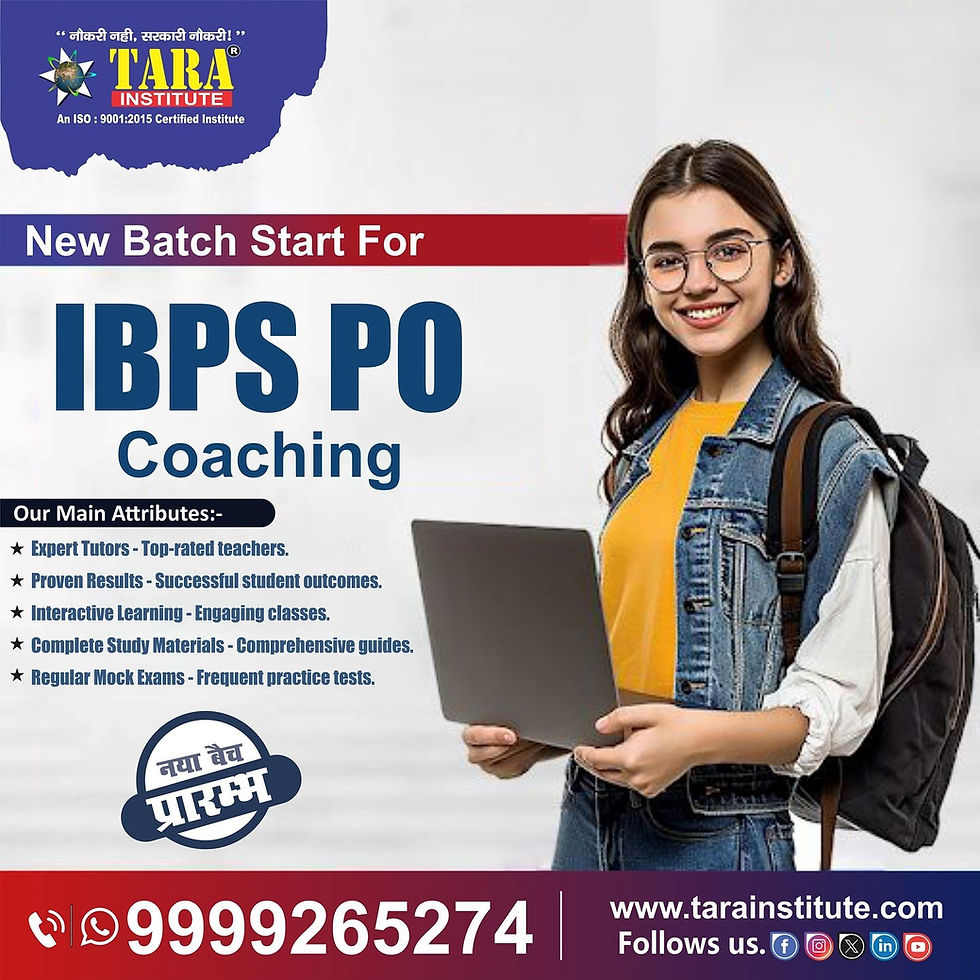Tips to Maximize the Benefits of PCS Coaching in Delhi
- tarainstitute70
- Aug 28, 2025
- 6 min read

Introduction: Why PCS Coaching in Delhi Matters
The Provincial Civil Services (PCS) examination is one of the most prestigious state-level exams in India, opening doors to administrative positions that shape governance at the regional level. While the exam is highly competitive, aspirants from across the country—and particularly from Delhi—flock to renowned coaching centers in pursuit of guidance, structure, and expert mentorship. Delhi has long been recognized as a hub for competitive exam preparation, attracting students with its top-tier faculty, abundant resources, and thriving peer-learning environment.
However, enrolling in PCS Coaching in Delhi is only the first step. To truly succeed, aspirants must learn how to maximize the benefits offered by these institutes. Coaching alone cannot guarantee success; rather, it is the student’s approach, strategy, and commitment that determine outcomes. This article provides a detailed, structured roadmap—covering everything from understanding the role of coaching and leveraging experienced faculty to balancing self-study and effectively using resources—to help aspirants get the most out of their PCS coaching experience in Delhi.
1: Understanding the Role of PCS Coaching in Delhi
Before diving into strategies for maximizing coaching benefits, it is crucial to recognize the role that coaching institutes play in an aspirant’s journey. At its core, PCS Coaching in Delhi serves as a structured guide, offering a systematic plan to cover a vast syllabus efficiently.
Aspirants often underestimate the scope of the PCS exam, which demands proficiency in multiple areas such as history, polity, geography, economics, general science, and current affairs. Coaching centers provide a roadmap—breaking down the syllabus into manageable portions, ensuring comprehensive coverage, and reducing the risk of overlooking critical topics.
Additionally, Delhi’s coaching institutes provide access to faculty members with years of expertise, often specializing in specific subjects. These mentors not only clarify concepts but also provide exam-oriented tips such as answer-writing techniques, time management strategies, and methods for approaching tricky questions. The peer-learning environment further enhances the experience, as aspirants interact with like-minded individuals, exchange knowledge, and motivate each other.
Another overlooked benefit is exposure to Delhi’s academic ecosystem. Being in the capital gives aspirants access to libraries, seminars, guest lectures, and direct exposure to current affairs events. For students from smaller towns, this environment can significantly enhance their preparation.
Thus, PCS coaching in Delhi acts as a catalyst—providing the push, structure, and confidence needed to navigate the complexities of the examination.
2: Choosing the Right PCS Coaching Institute in Delhi
Not all coaching institutes are created equal, and selecting the right one can determine whether an aspirant thrives or struggles. With dozens of coaching centers in Delhi promising success, students must evaluate them critically.
Key factors to consider include:
l Faculty Expertise: Look for institutes with subject-specialized faculty who not only teach content but also provide insights into exam patterns.
l Track Record of Success: Past results, student testimonials, and consistency of selections matter.
l Study Material and Test Series: Comprehensive, updated, and exam-relevant material is a must.
l Class Size: Smaller batches often allow more personalized attention.
l Flexibility: Institutes that provide both online and offline options are more adaptable.
Students should also visit demo classes before enrolling. A coaching center’s teaching methodology—whether it emphasizes rote learning or conceptual clarity—can make a huge difference. Additionally, aspirants must assess logistical factors such as location, travel time, and fee structure to avoid unnecessary stress during preparation.
Ultimately, the right institute is one that aligns with the student’s learning style, ensuring maximum productivity and confidence in preparation.
3: Leveraging Experienced Faculty for Guidance
The role of experienced faculty in PCS Coaching in Delhi cannot be overstated. Many teachers at reputed institutes have decades of experience, having studied multiple batches of aspirants and tracked changes in exam patterns over the years.
Students should actively engage with faculty by:
l Asking questions during lectures.
l Seeking clarification after class.
l Attending doubt-solving sessions.
l Following faculty-recommended reading lists.
Experienced faculty also provide insights beyond the textbooks—such as understanding how to frame answers in descriptive papers, predicting question trends, and integrating current affairs with static subjects. For example, linking constitutional provisions to recent Supreme Court judgments is a technique often taught by Delhi’s expert faculty.
Building a mentor-mentee relationship is invaluable. When faculty recognize a student’s strengths and weaknesses, they can suggest personalized strategies. This human connection often boosts morale, ensuring aspirants don’t lose motivation during tough times.
4: Balancing Coaching and Self-Study
A common misconception is that coaching alone ensures success. In reality, coaching only provides a framework—success depends largely on how aspirants utilize their self-study time.
Experts suggest following the 70-30 rule: dedicate 70% of study hours to self-study and 30% to coaching inputs. Self-study allows aspirants to revise, practice, and reinforce what they learn in class.
Some effective strategies include:
l Daily Revision: Reviewing notes after every class to strengthen retention.
l Self-Made Notes: Writing summaries in your own words for better recall.
l Answer Writing Practice: Simulating exam conditions to build speed and accuracy.
l Mock Tests at Home: Evaluating progress regularly.
Balancing coaching schedules with personal study also requires time management. Students should create a weekly timetable that accommodates coaching hours while prioritizing self-study for weak subjects.
This balance ensures aspirants don’t become over-reliant on coaching and instead develop the independence required to tackle unexpected challenges in the exam hall.
5: Mastering Time Management for PCS Preparation
Time is the most valuable resource during PCS preparation. With vast syllabi and multiple stages of the exam—Prelims, Mains, and Interview—efficient time management is critical.
Coaching institutes often provide study schedules, but aspirants must adapt these to their personal pace. Techniques such as the Pomodoro Technique (25-minute study sessions with 5-minute breaks) or block study sessions (focusing on one subject per 2–3 hours) can boost productivity.
Prioritization is also key. For instance, current affairs demand daily attention, while static subjects like history can be scheduled weekly. Aspirants must balance breadth with depth—covering the syllabus while ensuring conceptual clarity.
Regular mock exams offered by PCS Coaching in Delhi further help in time management by training students to attempt maximum questions within limited time. Practicing under timed conditions minimizes stress on the actual exam day.
6: Making the Best Use of Study Material and Test Series
One of the biggest advantages of enrolling in PCS Coaching in Delhi is access to curated study materials and structured test series. Unlike generic books, these resources are tailored to the PCS exam pattern.
Students should treat test series as seriously as the real exam. Analyzing mistakes after every test is more important than the score itself. Keeping an error log—documenting wrong answers, reasons for mistakes, and strategies for improvement—ensures continuous progress.
Study material must be supplemented with NCERTs, standard reference books, and newspapers like The Hindu or Indian Express. Coaching-provided monthly current affairs compilations are particularly useful for revision.
The key is not hoarding multiple sources but sticking to limited, reliable resources and revising them multiple times.
7: Building the Right Peer Group and Learning Environment
Delhi’s coaching hubs such as Mukherjee Nagar and Rajinder Nagar are buzzing with aspirants, creating a unique environment of shared ambition. Choosing the right peer group can significantly impact preparation.
A supportive peer group encourages healthy discussions, shares resources, and motivates during low phases. Group study sessions can be particularly useful for subjects like polity or current affairs, where debates and discussions enhance retention.
However, aspirants must avoid unproductive competition or unnecessary comparisons. The goal should be collaboration rather than rivalry. Creating a small, focused circle of peers aligned with one’s study style is the most effective way to leverage Delhi’s thriving academic ecosystem.
8: Staying Consistent and Motivated Throughout the Journey
PCS preparation is a marathon, not a sprint. Aspirants often lose steam midway due to burnout, lack of progress, or repeated failures in mock tests.
Coaching institutes in Delhi play an important role in keeping students motivated through periodic counseling, success stories, and facultyencouragement. Students must also cultivate self-discipline—setting small milestones, celebrating minor achievements, and maintaining a growth mindset.
Techniques such as visualization (imagining oneself as a PCS officer), journaling progress, and practicing mindfulness help sustain motivation. Importantly, aspirants should also maintain a balance between study and relaxation to avoid exhaustion.
9: Utilizing Online Resources Alongside Coaching
Many PCS Coaching Institutes in Delhi now provide hybrid programs with online lectures, recorded sessions, and digital study materials. Aspirants must utilize these resources to reinforce learning.
Online platforms offer flexibility—allowing students to revisit complex topics, catch up on missed classes, and access mock tests remotely. Aspirants should combine traditional classroom learning with digital tools such as mobile apps, current affairs podcasts, and YouTube explainer videos to enhance their preparation.
However, discipline is crucial. Online resources should complement coaching, not distract. Students should allocate specific hours for digital learning and avoid mindless browsing.
10: Conclusion – Turning Coaching into Success
PCS Coaching in Delhi provides aspirants with a structured foundation, experienced mentors, and access to top-quality resources. However, success ultimately depends on how effectively students utilize these opportunities.
By choosing the right institute, engaging with faculty, balancing self-study, mastering time management, leveraging study materials, building a strong peer group, staying consistent, and embracing online resources, aspirants can truly maximize the benefits of coaching.
In essence, coaching is a tool, not a guarantee. When used wisely, it transforms aspirants into confident, disciplined, and exam-ready candidates—capable of cracking one of the toughest state-level competitive exams in India. Delhi, with its unmatched ecosystem for competitive exams, can indeed be the stepping stone to PCS success—if students are willing to put in consistent effort alongside the guidance they receive.
Reference Link(OriginallyPosted):https://tarainstitutelearning.wordpress.com/2025/08/28/tips-to-maximize-the-benefits-of-pcs-coaching-in-delhi/




Comments